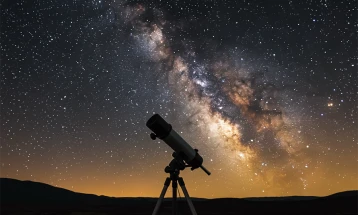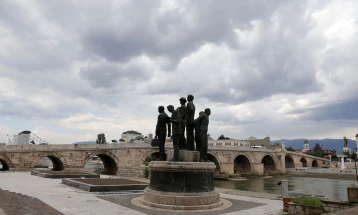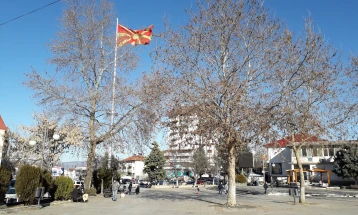Today in history
- 23 November 2024

23 November 2024 (MIA)
1174 – Saladin enters Damascus, and adds it to his domain.
1248 – Conquest of Seville by Christian troops under King Ferdinand III of Castile.
1499 – Pretender to the throne Perkin Warbeck is hanged for reportedly attempting to escape from the Tower of London. He had invaded England in 1497, claiming to be the lost son of King Edward IV of England.
1510 – First campaign of the Ottoman Empire against the Kingdom of Imereti (modern western Georgia). Ottoman armies sack the capital Kutaisi and burn Gelati Monastery.
1531 – The Second War of Kappel results in the dissolution of the Protestant alliance in Switzerland.
1644 – John Milton publishes Areopagitica, a pamphlet decrying censorship.
1733 – The start of the 1733 slave rebellion on St. John in what was then the Danish West Indies.
1808 – French and Poles defeat the Spanish at Battle of Tudela.
1810 – Sarah Booth debuts at the Royal Opera House.
1863 – American Civil War: Battle of Chattanooga begins: Union forces led by General Ulysses S. Grant reinforce troops at Chattanooga, Tennessee, and counter-attack Confederate troops.
1867 – The Manchester Martyrs are hanged in Manchester, England, for killing a police officer while freeing two Irish nationalists from custody.
1876 – Corrupt Tammany Hall leader William Magear Tweed (better known as Boss Tweed) is delivered to authorities in New York City after being captured in Spain.
1889 – The first jukebox goes into operation at the Palais Royale Saloon in San Francisco.
1890 – King William III of the Netherlands dies without a male heir, and a special law is passed to allow his daughter Princess Wilhelmina to succeed him.
1910 – Johan Alfred Ander becomes the last person to be executed in Sweden.
1914 – Mexican Revolution: The last of U.S. forces withdraw from Veracruz, occupied seven months earlier in response to the Tampico Affair.
1918 – Heber J. Grant succeeds Joseph F. Smith as the seventh president of The Church of Jesus Christ of Latter-day Saints.
1924 – Edwin Hubble’s discovery that the Andromeda nebula is actually another island universe far outside of our own was first published in The New York Times.
1934 – An Anglo-Ethiopian boundary commission in the Ogaden discovers an Italian garrison at Walwal, well within Ethiopian territory. This leads to the Abyssinia Crisis.
1936 – Life magazine is reborn as a photo magazine and enjoys instant success.
1939 – World War II: HMS Rawalpindi is sunk by the German battleships Scharnhorst and Gneisenau.
1940 – World War II: Romania becomes a signatory of the Tripartite Pact, officially joining the Axis powers.
1943 – World War II: The Deutsche Opernhaus on Bismarckstraße in the Berlin neighborhood of Charlottenburg is destroyed. It will eventually be rebuilt in 1961 and be called the Deutsche Oper Berlin.
1943 – World War II: Tarawa and Makin atolls fall to American forces.
1944 - The National Library in Skopje, later renamed into St. Clement of Ohrid National and University Liberary is founded under an act passed by ASNOM's Presidium.
1946 – French naval bombardment of Hai Phong, Vietnam, kills thousands of civilians. This was to lead to the First Indochina War.
1953 – Pilot Felix Moncla and Lieutenant Robert Wilson disappear while in pursuit of a mysterious craft over Lake Superior.
1955 – Cocos Islands are transferred from the control of the United Kingdom to that of Australia.
1959 – French President Charles de Gaulle declares in a speech in Strasbourg his vision for “Europe, from the Atlantic to the Urals.”
1963 – The BBC broadcasts the first episode of “An Unearthly Child” (starring William Hartnell), the first story from the first series of Doctor Who, which is now the world’s longest-running science-fiction drama.
1971 – Representatives of the People’s Republic of China attend the United Nations, including the United Nations Security Council, for the first time.
1972 – The Soviet Union makes its final attempt at successfully launching the N1 rocket.
1974 – Sixty Ethiopian politicians, aristocrats, military officers, and other persons are executed by the provisional military government.
1976 – Apneist Jacques Mayol is the first man to reach a depth of 100 m undersea without breathing equipment.
1978 – Cyclone kills about 1000 people in Eastern Sri Lanka.
1978 – The Geneva Frequency Plan of 1975 goes into effect, realigning many of Europe’s longwave and mediumwave broadcasting frequencies.
1980 – The 6.9 Mw Irpinia earthquake shakes southern Italy with a maximum Mercalli intensity of X (Extreme), killing 2,483–4,900, and injuring 7,700–8,934.
1981 – Iran–Contra affair: Ronald Reagan signs the top-secret National Security Decision Directive 17 (NSDD-17), giving the Central Intelligence Agency the authority to recruit and support Contra rebels in Nicaragua.
1985 – Gunmen hijack EgyptAir Flight 648 en route from Athens to Cairo. When the plane lands in Malta, Egyptian commandos storm the aircraft, but 60 people die in the raid.
1992 – The first smartphone, the IBM Simon, is introduced at COMDEX in Las Vegas, Nevada.
1993 – Rachel Whiteread wins both the £20,000 Turner Prize award for best British modern artist and the £40,000 K Foundation art award for the worst artist of the year.
1996 – Ethiopian Airlines Flight 961 is hijacked, then crashes into the Indian Ocean off the coast of Comoros after running out of fuel, killing 125.
2001 – The Convention on Cybercrime is signed in Budapest, Hungary.
2003 – Rose Revolution: Georgian president Eduard Shevardnadze resigns following weeks of mass protests over flawed elections.
2004 – The Holy Trinity Cathedral of Tbilisi, the largest religious building in Georgia, is consecrated.
2005 – Ellen Johnson Sirleaf is elected president of Liberia and becomes the first woman to lead an African country.
2006 – A series of bombings kills at least 215 people and injures 257 others in Sadr City, making it the second deadliest sectarian attack since the beginning of the Iraq War in 2003.
2007 – MS Explorer, a cruise liner carrying 154 people, sinks in the Antarctic Ocean south of Argentina after hitting an iceberg near the South Shetland Islands. There are no fatalities.
2009 – The Maguindanao massacre occurs in Ampatuan, Maguindanao, Philippines.
2010 – Bombardment of Yeonpyeong: North Korean artillery attack kills two civilians and two marines on Yeonpyeong Island, South Korea.
2011 – Arab Spring: After 11 months of protests in Yemen, Yemeni president Ali Abdullah Saleh signs a deal to transfer power to the vice president, in exchange for legal immunity.
2015 – Blue Origin’s New Shepard space vehicle became the first rocket to successfully fly to space and then return to Earth for a controlled, vertical landing.







